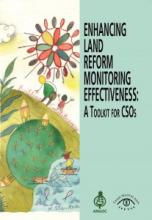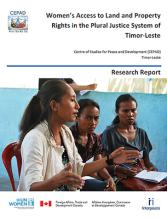Land Library Search
Through our robust search engine, you can search for any item of the over 73,000 highly curated resources in the Land Library.
If you would like to find an overview of what is possible, feel free to peruse the Search Guide.
/ library resources
Showing items 37 through 45 of 104.Land, and in particular agricultural land, is central to livelhoods in rural Zambia. Zambia is characterised by a dual legal system of customary and statutory law and by dual land tenure, with state land and customary land.
This framework aims to help civil society organisations to monitor land reforms.
Characterized as divinely ordained, the Islamic law of inheritance defines women’s rights to property of the deceased with specific roles and responsibilities for each individual.
Improved access to gender-disaggregated data can be a catalyst to improving gender equality and provide opportunities for the so-called “Third Sector” of non-governmental and local organizations, especially those representing women.
The Legal Assessment Tool (LAT) for gender-equitable land tenure was developed by FAO’s
Gender and Land Rights Database (GLRD) for the purpose of providing prompt, targeted and
effective policy advice and capacity development to FAO’s Member countries working towards
Includes views of land registration in Omahalya Village in the Omusati Region of Namibia, connection to the land, value of registration, protection from land grabbing and conflicts, investing in their land, women’s empowerment, the commonage.
Contains recognise and strengthen customary rights starting with statutory recognition; community rather than individual titling must be further explored as an option; women’s land rights remain weak under customary tenure but formalization is not necessarily the answer; custom or rights for wome
Las dos historias de vida que se presentan en este documento muestran las estrategias que dos mujeres asumieron para superar la discriminación en el acceso a la tierra vía herencia, empleando para ello en un caso, la negociación y los acuerdos familiares, y en el otro, la compra venta negociada.
The Centre of Studies for Peace and Development (CEPAD) with support from UN Women, conducted participatory action research over a period of 12 months in order to examine women’s access to justice in the plural legal system of Timor-Leste with a focus on women’s rights to land and property.





